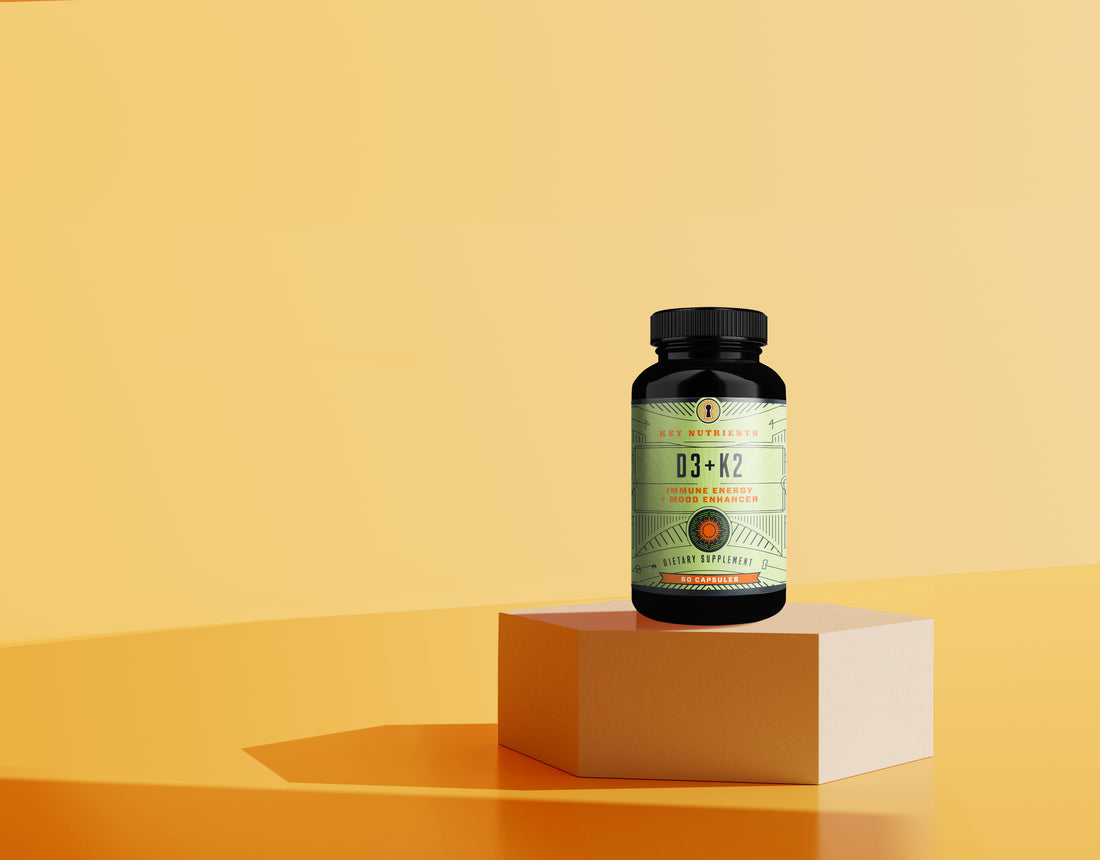Vitamins D3 and K2: What are the Benefits?
The combination of vitamins D3 and K2 is a powerful way to keep yourself in great health. While they have benefits individually, they work together best to boost your immune system, build strong bones, and so much more!
D3, also known as cholecalciferol, is typically made in your skin when you’re exposed to unfiltered sunlight. Most people in the modern world don’t get outside that much, so we don’t produce as much vitamin D3 as our ancestors would have. K2 is found in foods like natto, beef liver, and egg yolks, but it’s only present in small amounts, not enough to maintain optimal health.
Compared to other vitamins, these two work better in harmony than any other two. The two of them work together to ensure the proper absorption of calcium, an essential mineral for the body. In addition to promoting bone health, these vitamins will benefit cardiovascular health as well, and strengthen the immune system to fight off viruses and other pathogens.
Let’s learn more!
What are the benefits of vitamin D3?
Many studies have shown that vitamin D3 can improve bone health, support the immune system, and keep blood pressure levels in the normal range if taken in adequate amounts. Many scientists and doctors believe that vitamin D, better known as the "Sunshine Vitamin," is critical to overall health.
This vitamin is actually classified as a hormone since it can act as a signaling molecule and modulate many processes in our bodies. We can naturally synthesize Vitamin D3 in response to sunlight, and nearly every cell in our bodies has receptors for it.
In particular, it improves calcium absorption through the intestinal walls, which in turn improves calcium absorption in the body as a whole, helping this mineral bind to the matrix of your bones. Vitamin D3 has been shown to increase the amount of calcium we absorb from our food by 30-40 as compared to individuals who were not taking vitamin D3.
Vitamin D3 can be found in a variety of foods. There is a fine line between too much and too little sunlight. As a result, daily vitamin D3 supplementation is the most effective strategy for ensuring optimal levels. Animal sources such as salmon, swordfish, white fish, and tuna, as well as eggs and white meats. Plant-based foods such as mushrooms are also high in this important vitamin.
Vitamin K works synergistically with vitamin D
Vitamin K1 (phylloquinone, found primarily in green leafy vegetables) and vitamin K2 (menaquinone, found primarily in animal products and fermented dairy) are both fat-soluble vitamins. K1 is not well absorbed in the intestines, and a larger amount has to be taken to make any difference. K2 on the other hand can be taken in smaller amounts with a greater benefit to your health since it’s more easily absorbed.
K2 can be further divided into the MK-4 and MK-7 subtypes. MK-4 is a fast-absorbing form that aids in the formation of the bone matrix. MK-7, which has a long half-life in the body, can help keep your arteries flexible and healthy. Improved cardiovascular health, arterial flexibility, and longer life expectancy are all linked to two particular MK isoforms: MK-6 and MK-9.
How do vitamins D and K work together?
So, how do vitamin D3 and vitamin K2 complement one another in a beneficial way? Calcium absorption into the blood is regulated by vitamin D3 in the intestines. Your bones get the benefit of that calcium because of Vitamin K2.
You can think of calcium as a baton, with vitamin D3 and vitamin K2 as the runners in a relay race. As a supplement, vitamin D3 and vitamin K2 can help you get the most out of calcium, but you should take both to get the most out of them. It’s this same two-part process that gives this combination of vitamins a powerful effect in your cardiovascular and immune systems: D3 begins the transport of nutrients that K2 completes.
How much vitamin D3 and K2 do I need to consume each day?
A healthy blood level of vitamin D can be tested by your doctor, and a good baseline that you would see on your test results is a 25-hydroxyvitamin D level of between 50 and 80 ng/mL. Most people will need between 2,000 and 10,000 international units (IU) per day (50 micrograms to 250 micrograms) as a supplement to maintain this level. If you don’t have your blood tests on this vitamin, that’s OK! Taking between 2,000 and 10,000 IU per day is safe for most people, and you can base your ideal range on how much sun you typically get.
It is recommended that adults take 2.5 mg or more of total vitamin K per day, including K1 and K2. Focus on K2 for the most bioavailable form of this vitamin. Depending on your bone and arterial health, you may need more or less. If you're unsure, consider getting tested to see how you stack up.
What happens if you don't have vitamin K2?
Taking these two supplements separately isn't going to do you any harm, but taking them together will save you time. If you're taking vitamin D3 without vitamin K2, you may not be able to transfer the calcium to your bones properly, and it may instead end up in your vascular tissue. This is a real concern. As a result, vitamin K is necessary for activating proteins that bind calcium to bone, such as matrix GLA and osteocalcin.
Vitamins D3 and K2 are known to be safe and healthy for most people.
Even at higher doses, both vitamins have a good safety record. If you are taking any medications, consult your physician to ensure that there are no cross-reactions.

